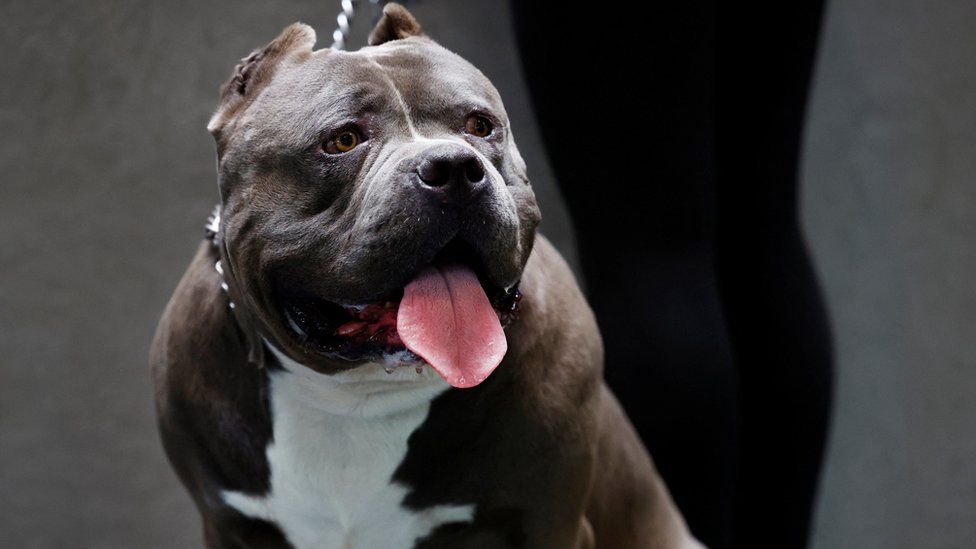American bully XLs added to list of banned dogs in England and Wales
- Published
- comments

American bully XLs are being added to the list of banned dogs in England and Wales, making it illegal to own one without an exemption from 1 February next year.
From January the dogs will also have to be muzzled and on a lead in public.
There will be a longer deadline for owners to ensure the dogs are neutered.
It follows a number of attacks involving the breed, although owners insist the dogs, despite their appearance, make lovable pets.
From 31 December 2023 it will be against the law to sell, abandon, breed from or give away an American bully XL, or have one in public without a lead or muzzle.
If your dog is less than one year old on 31 January 2024, it must be neutered by 31 December next year. If your dog is older than one year old on 31 January 2024, it must be neutered by 30 June.
The guidance is similar to that issued for the four breeds which were banned under the Dangerous Dogs Act 1991: the American pit bull terrier, the Japanese tosa, the Dogo Argentinos and the Fila Brazileiro.
Published by Defra, the new rules also give details defining an American Bully XL, which is not a breed recognised by the Kennel Club in the UK.
According to this, the dogs are a "large dog with a muscular body and blocky head, suggesting great strength and power for its size. Powerfully built individual".
Prime Minister Rishi Sunak announced the breed would be banned following a series of incidents.
These included the death of a man after a suspected attack by an American bully XL in Walsall on 14 September. Days earlier, an 11-year-old girl, along with two men, were attacked by an American bully XL in Bordesley Green, Birmingham.
In 2021, 10-year-old Jack Lis died from severe neck and head injuries after he was attacked by an American bully XL in Caerphilly. His mother, Emma Whitfield, has been calling for the dogs to be banned.
The new guidance does not apply to Northern Ireland or Scotland.
Both currently ban the pit bull terrier, Japanese tosa, Dogo Argentino and Fila Braziliero.
If Scottish ministers agree, then the ban will be applied in Scotland.
In Northern Ireland a ban on an American bully XL would require a separate change to legislation, either by a sitting Assembly and Executive or through an intervention by the Northern Ireland Secretary.
The UK's chief veterinary officer Christine Middlemiss previously said there would not be a "cull" of American bully XLs but rather guidance to allow owners to keep them under certain conditions.
To do this, owners have to apply to register their pets on the Index of Exempted Dogs.
This is subject to a £92.40 application fee, to cover administration costs.
The current exemption scheme for banned breeds allows for an exemption if a court is satisfied that the dogs do not pose a danger to the public and their owners are deemed to be fit and proper people to own a dog of that type.
There are almost 3,500 banned dogs living legally at home with their owners in England, Scotland and Wales under the scheme, data released from the government to the BBC has revealed.
Before a dog can be exempt it must be neutered, micro-chipped and have third party insurance. There are also strict conditions, including being kept on a lead and muzzle in public.
The Dangerous Dogs Act gives the government the power to ban any breed appearing "to be bred for fighting or to have the characteristics of a type bred for that purpose".
Police have the power to seize any prohibited dog that is in a public place.
Many animal charities have opposed a ban.
The Dog Control Coalition - which includes Battersea, Blue Cross, the Dogs Trust, BVA, the Scottish SPCA, the Kennel Club and Hope Rescue - told the BBC that breed-specific bans had been proven to be ineffective.
The problem, it says, lies with owners.
"The government must tackle the root issue by dealing with the unscrupulous breeders who are putting profit before welfare, and the irresponsible owners whose dogs are dangerously out of control," it says.